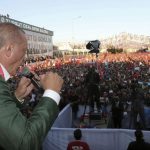The season of electoral miracles is upon us once more. The season of thrilling possibilities that has swept Turkey ahead of every election for the past four or five years. The source of excitement this time is the March 31 local elections, the results of which will give birth to a new spring and the country’s salvation, at least in the dreams of many Turks. The same pipe dreams are encapsulated by the signs in the windows of some shrewd barbershops: Free Haircuts Tomorrow. But of course, tomorrow never comes.
Let us listen in on the excitement: In a country that is still in a daze from the polls of previous years, there are those who are still speculating about snap elections.
There are those who are hanging their hopes on opposition parties that might emerge from the ruling Justice and Development Party (AKP). Those who are settling for the has-beens of the AKP establishment; Abdullah Gül, Ahmet Davutoğlu and Ali Babacan.
Those who are looking to shoddy opinion polls for relief from sleepless nights.
Those who are tracking President Recep Tayyip Erdoğan’s moves for signs he will open up new paths for the country’s future.
Those who declare that once he has obtained what he wants, the president will release his grip and embrace democracy.
Those who await the regime’s democratic opening, brought about to avoid further alienating the United States and European Union.
And those who rally the troops with cries of “this too shall pass”.
The truth that appears clearly before us is a far cry away. The regime’s equilibrium was irrevocably upended by the 2013 Gezi Park protests and government corruption scandal at the end of the same year – 2013 was the year rulers were blinded by anger.
The elections that followed on June 7, 2015, when the ruling AKP lost its parliamentary majority and a Kurdish party, the Peoples’ Democratic Party, (HDP) entered parliament for the first time in history, was the point at which the Turkish establishment unabashedly began to see red.
From that point onward, in the eyes of Erdoğan and the regime, the overarching goal was to stay in power, meaning anything and everything became permissible to achieve that end. The “national front” formed in response to the growing Kurdish presence in Turkish politics created a dynamic that the regime continues to employ profusely.
Through the massacres that were organised and perpetrated that summer, the coup attempt of July 2016, the referendum on regime change in 2017, and the parliamentary and presidential elections last year, the system has been locked in, and the regime has settled in for the most part. The final flaw in the plan, or final nail in the coffin of Turkish politics, is the requirement of establishing control over the municipalities in order to be able to maintain law and order across the entire country. Have no doubt, this too shall be accomplished.
As has been said many times before, this regime does not have the luxury of losing power, especially not through elections. The results of every election since 2013, however non-free and unfair, prove that putting hopes in elections to find an alternative to the regime is a futile exercise. The three general elections, two presidential elections, one local election and a referendum were popular consultations that increasingly moved away from the values of freedom and fairness that are fundamental to representative democracy. Domestic and international watchdogs are in consensus on this fact.
The AKP came to power through elections, but elections will not be enough for it to relinquish power. If the regime were to lose control, those in power would have to account for their actions in front of the High Court. That is crystal clear. Furthermore, their role in the Syrian civil war makes indictment by the International Criminal Court a strong possibility as well.
As for local governments, I should again remember what path the regime will take in the event that it does not achieve the intended results in the elections.
Erdoğan would withhold resources from municipalities controlled by opposition parties that refuse to cooperate, and would assign administrators to govern municipalities for which he harbours hatred. He has made this explicitly clear time and again.
He has committed to assign administrators to towns and cities that elect mayors from the pro-Kurdish HDP, “if they are linked to terror ”.
He has declared that regardless of which candidate voters elect, the only decision maker in Turkey from now on is the Presidential Palace.
To that end, the presidency passed the Executive Order 17 in August 2018 tying virtually all administrative institutions and organisations outside of the general budget to the Treasury and Finance Ministry, which is run by Erdoğan’s son-in-law.
In other words, municipalities will ask for permission to spend resources in advance, and only make payments, such as employee salaries, if they are able to obtain approval. Opposition parties are gearing up to play this botched game in the municipalities they win.
When the AKP was first elected to government in 2002, one of its first changes was to lower the share of budgetary resources allocated to municipalities from 15 to 10 percent, therefore indirectly centralising municipal operations. Municipal governments were rendered dependent on and beholden to the central government. Erdoğan has now delivered the final blow. Regardless of what results the elections bring, local governance in Turkey has ended.
Veteran candidates from opposition parties, such as Ekrem İmamoğlu running for mayor of Istanbul and Tunç Soyer who has a good chance of winning in Izmir, have announced they will cooperate with Erdoğan, and will not hesitate to knock on his door. As for Mansur Yavaş, who could with a stroke of luck win in Ankara, how could he pursue local policies in spite of, or in opposition to Erdoğan?
***
In short, the electoral farce will end in two weeks, and its results are clear. The only potential surprise would be for election participation rates to fall below 50 percent, in which case Turkey, like Venezuela, would undergo a deep but auspicious crisis of legitimacy, and everything would change.
Preparing for the likely event in which election participation rates are to the regime’s liking, it behoves us to ask the difficult questions and consider what will happen after April 1. The next scheduled election will not be until June 2023, but there might be no more elections at all.
The mountain of economic and international crises (Syria, Russia, the USA) will inevitably stoke dissent. Erdoğan will fear for his security, along with the regime and his millions of supporters. We should acknowledge that they have the potential to shut the country down entirely. In such a harsh and violent environment of societal destruction, it will be impossible to do politics.
Rather than struggling to pursue politics as if the system had not taken a totalitarian turn, instead of conjuring dreams of policy changes made possible by elections, we must expend our efforts considering ways and methods of resisting fascism. Assuming these ways and methods do not include violence, they can only manifest as civil disobedience that is light years away from Turkey!
By Cengiz Aktar
Source: Ahval News



